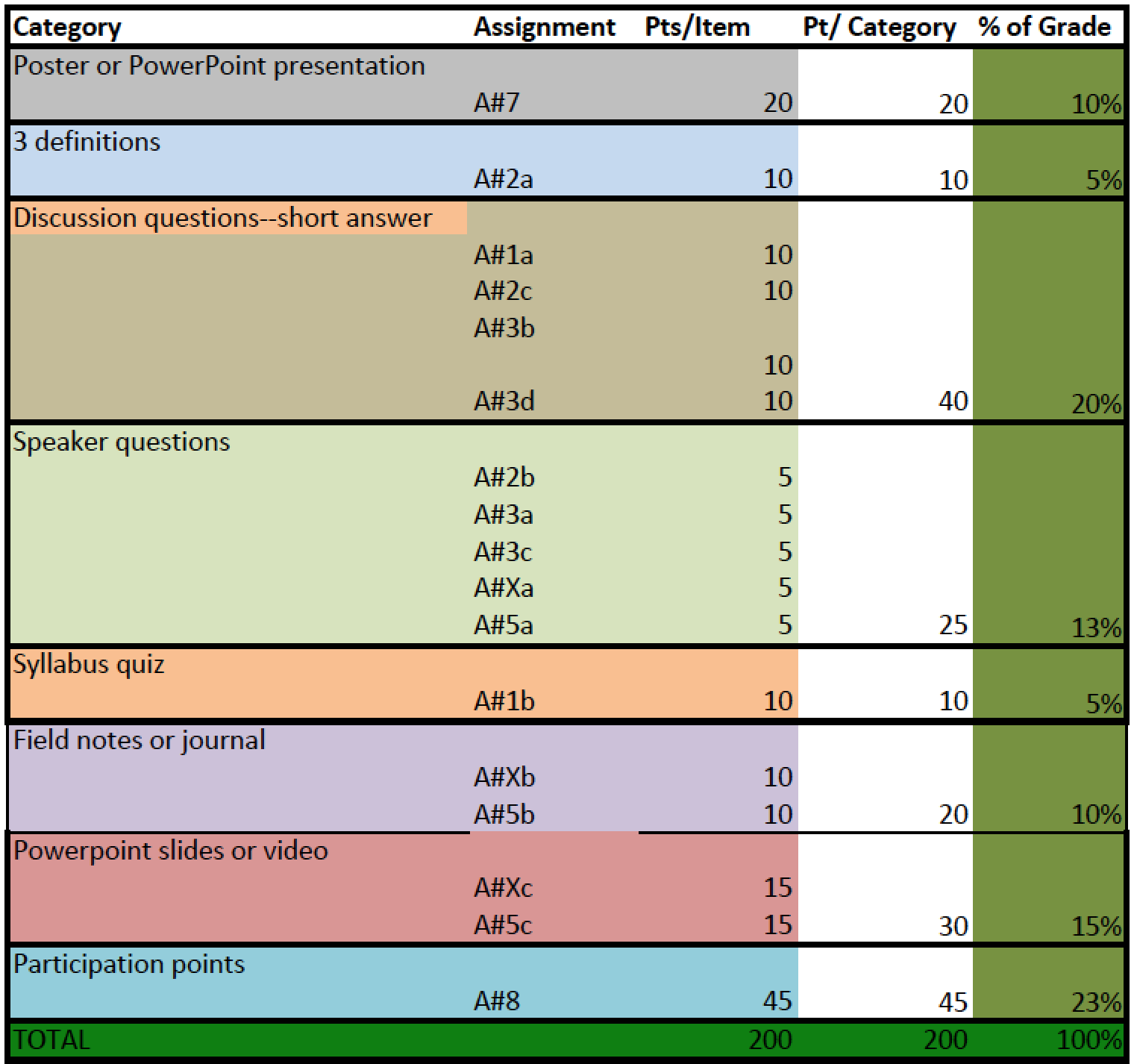| Week |
Date |
Topics |
Assignment(s) |
| 1 |
W: 3/30 |
Introductions, protocols and rules for students visiting tribal communities (e.g., cultural competency/respect), Indian 101 |
Sign up for field trips and sign field trip waiver (Submit a signed copy of your waiver on Canvas). There are 3 field trips organized in this class. Trip #2 is required, but you can choose between Trip #1 or #3. |
| 1 |
F: 4/1 |
Indigenous Sustainability I: environmental challenges, tribal sovereignty, treaty rights
We'll have a 30-45 min class discussion on the topics to the right
|
- A#1a: Discussion questions: In your own words, and for each question, clearly develop a 150-200 word answer to share in class and submit on Canvas for credit. Your grade will be based on content, correct grammar, punctuation and spelling.
- What is tribal sovereignty?
- Why are treaties important to tribal nations and their citizens?
- What do tribes mean when they say their "Treaties are at Risk?
- A#1b: There will be a short quiz on the class syllabus--You can prepare by thoroughly reading the syllabus.
|
| 2 |
W: 4/6 |
Indigenous Sustainability II: Indigenous ways of knowing and relationality
We'll have a 20-30 min class discussion on the topic(s) to the right
|
20 min discussion topic:
-
A#2a: Bring 3 definitions of sustainability. If they are not already, indigenize these definitions . Use APA style formatting for your citations. In your own words, and for each definition, clearly write a definition using at least 40 words. You'll share your ideas in class and submit on Canvas for credit. Your grade will be based on content, correct grammar, punctuation, spelling and correct citations use.
|
| 2 |
F: 4/8 |
Indigenous Sustainability III: Indigenous health and environmental health
|
- Guest Speaker: Larry Campbel, Tribal Historical Preservation Officer for the Swinomish Indian Tribal Community in the Cultural Resource Office and expert on tribal wellbeing and helath
- A#2b: Bring 1-2 questions to ask our guest speaker
- A#2c: Discussion question:
- How do you perceive health?
- And how does environmental integrity matter to your wellbeing?
|
| 3 |
W: 4/13 |
Indigenous Sustainability IV: Case studies of tribal environmental management, and Intellectual Property Rights (IPR)
|
- Guest Speaker: Preston Hardison, Natural Resources and Treaty Rights Policy Analyst for the Tulalip Tribes of Washington and global expert on Intellectual Property Rights
- A#3a: Bring 1-2 questions to ask our guest speaker
- A#3b: Discussion question:
- Why do we need to consider IPR when working with tribal
communities?
- What are some of the concerns of tribal nations in regard to knowledge exchange?
|
| 3 |
F: 4/15 |
Guest Speaker and Indigenous Sustainability V: Field work, indigenous methodologies, and history of research with tribes
|
- Guest Speaker: Viccy Salvar, Sr. Sustainability Policy Advisor for US Environmental Protection Agency, Region 10.
- A#3c: Bring at 2 questions for guest speaker
- Prepare for field trip and field work
-
A#3d: Discussion question:
- Describe an example of a research project carried out by scientists within a tribal community. What are the ethical challenges or principles used by these researchers?
- How are tribes using western and indigenous knowledge systems to address climate change and environmental degradation in their communities, nationally or globally?
|
| 4 |
TH: 4/21 |
Field trip #1 of Enabling Indigenous Sustainability: Confederated Tribes of the Umatilla Indian Reservation
DO NOT BE LATE!
|
- A#Xa: Prepare 1-2 questions for speakers and keep journal
|
| 4 |
F: 4/22 | Earth Day: Field trip #1 of Enabling Indigenous Sustainability: Confederated Tribes of the Umatilla Indian Reservation |
- Prepare 3 questions for speakers (A#Xa) and keep journal (A#Xb)
- A#Xc: Compose 5-10 PowerPoint slides or a 3-4 minute video (you can use your cell phone camera, but follow class guidelines) that best illustrate your experience on this field trip: Due on 4/29
|
| 5 |
W: 4/27 |
Field trip #2 in-class preparation and presentations: Rain gardens, water quality and phytoremediation 101 by Cari Simson and Howard Sprouse
|
- A#5a: Prepare 2 questions for speakers and keep journal
|
| 5 |
F: 4/29 |
Field trip #2 of Enabling Sustainability: Rain gardens 101 in Seattle neighborhood (All day: precise times TBD)
Project collaborators: Micah McCarty, Cari Simson, Howard Sprouse and Clarita Lefthand-Begay |
- Prepare 2 questions for speakers (A#5a) and keep journal (A#5b)
- A#5c: Compose 5-10 PowerPoint slides or a 3-4 minute video (you can use your cell phone camera, but follow class guidelines) that best illustrate your experience on this field trip: Due on 5/6
|
| 6 |
TH: 5/5 |
Field trip #3 of Enabling Indigenous Sustainability: Native Plant Center on the Elwha
DO NOT BE LATE!
|
|
| 6 |
F: 5/6 |
Field trip #3 of Enabling Indigenous Sustainability: Native Plant Center on the Elwha |
- Prepare 2-3 questions for speakers (A#Xa) and keep journal (A#Xb)
- A#Xc: Compose 5-10 PowerPoint slides or a 3-4 minute video (you can use your cell phone camera, but follow class guidelines) that best illustrate your experience on this field trip: Due on 5/11
|
| 7 |
W: 5/11 |
In-class preparation for Poster Presentation and review of quarter (A#7) |
|
| 7 |
F: 5/13 |
Living Breath of wǝɫǝbʔaltxʷ: Indigenous Foods and Ecological Knowledge Symposium |
- A#7: Present Posters
- Last Day of Class
|
| FINAL |
|
No Final |
|
